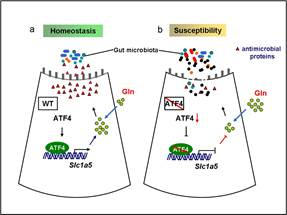
Amino acid sensing protein ATF4 regulates intestinal homeostasis by sensing amino acids
Abstract
The intestine is not only a digestion and absorption organ, but also the largest nutrient sensing organ, which regulates metabolic homeostasis. However, the functions and mechanisms of intestinal amino acid sensing need to be elucidated. We found that levels of ATF4 were significantly decreased in inflamed intestinal mucosa from patients with active CD or active UC compared with those from uninflamed regions or intestinal mucosa from control individuals. ATF4 was also decreased in colonic epithelia from mice with colitis vs mice without colitis. Mice with disruption of Atf4 specifically in intestinal epithelial cells (Atf4ΔIEC mice) developed spontaneous enterocolitis and colitis. Atf4ΔIEC mice had decreased serum levels of glutamine and reduced levels of antimicrobial peptides in ileal Paneth cells. Mechanically, ATF4 deficiency reduced glutamine uptake by intestinal epithelial cells and expression of antimicrobial peptides by decreasing transcription of Slc1a5. ATF4 might therefore be a target for the treatment of IBD.